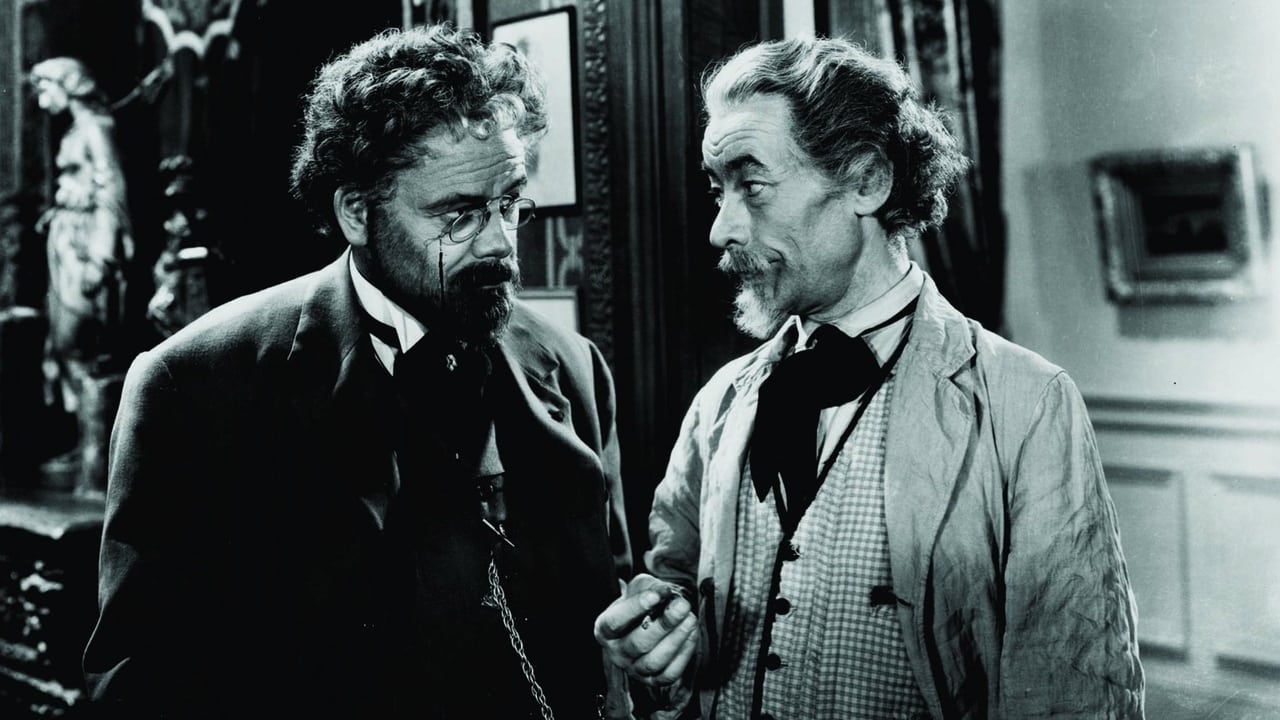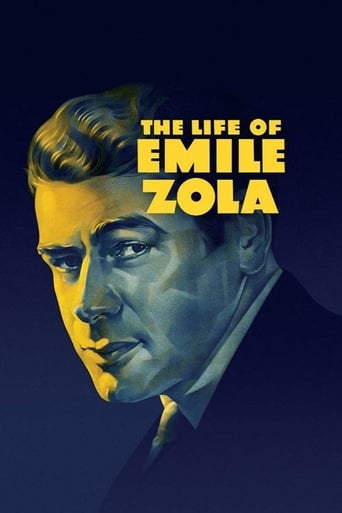

The story of Emile Zola, French writer and social commentator. We track his life from his days as a struggling artist, sharing an apartment with Paul Cezanne, to his first bestselling book, and resulting elevation from poverty, to his forays into social and political commentary through his books, to his involvement in the Dreyfuss Affair.Quite interesting and edifying. I must admit that I had not heard of Emile Zola or the Dreyfuss Affair before this movie. Having seen the influence of the man on society and literature I am now embarrassed to say that. Clearly incredibly talented and principled and willing to put his own neck and reputation on the line in order to fight injustice.The movie captures these qualities very well. I was expecting a rather dry, blow-by-blow delivery and, while the plot does develop in linear form, it is never dull and is always engaging.Won the 1938 Best Picture Oscar.
... View MoreThe Life of Emile Zola transported me to a place that I have never been, yet, is so familiar to me. I was thrust into a world where acting meant something more artistic than it commonly does today. I entered a place with a very theatrical grip on the storyline playing out on screen. The 1937 Best Picture winner directed by William Dieterle took me to that place. It proved to be an interesting and fun journey to see one of the first biopics. I am grateful for Oscar month to introduce me to yet another film that I may not have interacted with had it not nabbed Oscar's top prize. French author Emile Zola (Paul Muni) was no stranger to struggle. His tireless pursuit of his writing dreams left him broke and only able to afford to share a tiny apartment with painter, Paul Cezanne (Vladimir Sokoloff). Bouncing from job to job, Zola had a difficult time maintaining employment due to his outspoken nature. When inspiration and opportunity struck together, Zola was able to create his masterwork, Nana. His outspokenness would rear its head again when Zola entangled himself in the Dreyfus affair; the case of Alfred Dreyfus falsely convicted of giving classified military information to the Germans, a case largely fueled by anti-Semitism. Zola was so outspoken in the case of Alfred Dreyfus that on of his letters to his defense landed him in court for libel. Zola manages to become a successful literary personality while speaking out against the social injustices that plague his time. Some incredible cinematic devices were used to advance this film. To pass time and show the progression of the case and Zola's success, newspaper clippings flashed on-screen. Another show of Zola's success included the increasingly grandiose window displays with each next success Zola released. Both of these methods were extremely effective in avoiding the belaboring effort of slow plot advancement. The acting was great in this film, with each actor embodying a theatrical performance so common in films from this era. The makeup was exceptional as Zola ages dramatically throughout the film. I also found the courtroom speech of Zola berating the underlying issues of the Dreyfus affair to be impactful. With so much in this film to latch onto, there is something in Emile Zola for everyone.Even though anti-Semitism drove the Dreyfus Affair, little of it was mentioned in the film. I don't think that this admission takes away from the film, as there is plenty of implicit evidence as to the reason for Dreyfus's blame. I found the editing most effective in driving the film. The theme of always defending your fellow man from injustices was wonderfully juxtaposed with Zola's increasing success as a writer. With each copy of his provocative books sold, Zola gained a bigger platform for seeking social equality. A socially important film, covering issues that persist today, The Life of Emile Zola was the perfect choice for the Academy to crown as its Best Picture for 1937.
... View MoreWilliam Dieterle's The Life of Emile Zola (1937) is the fictionalized biographical account of Emile Zola's (played by Paul Muni) involvement in the Alfred Dreyfus (Joseph Schildkraut, in an Oscar winning performance.) affair saying for Dreyfus's wife (played by Gale Sondergaard)that it was unwise to think that Dreyfus actually was falsely accused of committing the crime of treason. Not only it talks about Zola's involvement in the Dreyfus trial, it also talks about Zola's career as an author, as well as his trial for being a traitor. One of the problems that I have with this movie is Donald Crisp's performance as Zola's lawyer, for me it is a performance that it is a little over the top, the second problem that I have with this film is that it was made in Hollywood when I really do think it should have been made in France. Zola's death in the end of this movie is what shocked me the most in the movie because it was the scene I least expected. But in the end it was an extraordinary story , it had very good acting, writing, and directing, as well as makeup. I think that the writers Norman Reilly Rane, Heinz Herald, and Geza Herczeg should have revised the Donald Crisp performance, and i really think that Jean Renoir should have gotten a grasp at directing it with all of those Hollywood people that were in this movie.
... View MoreThis Movie remains elusive in two regards. Paul Muni, one of the most exalted and honorable Actors of the Thirties (hardly a name mentioned or even recognized among Cinema goers Today) and Emile Zola a Crusader for Human Rights and "The Truth" who was very popular and influential in late Nineteenth Century France (is virtually unknown, unread and forgotten).But not in 1937, just a few decades after His Death, His Legacy was much more in the Public Conscientious. So, Muni was given the Role (Won the Oscar the Year before as Louis Pasteur) and Zola was given the Royal Hollywood Studio treatment and managed to garner many Oscar Nominations and did Win for Best Picture of the Year.It is a straightforward, Low-Key presentation that is glossy and finely Produced with all the Studio Craftsman contributing to accessibility and appeal as Social Commentary Entertainment. Viewers Today may opine with such things as overrated, unremarkable, slow, stodgy, hammy, and lacking in what has become an ever increasing, over the Years, reliance of less nuance and more crackling and crisp Cinema.But the Message is the Medium here and without doubt it is delivered with intelligence. That is the remaining residue of this Film. A no frills introspection of one Freedom Fighter that used a Pen as His Weapon. It is just as Mighty coming from the Heart and in the hands of Zola and this Hollywood Ography.
... View More